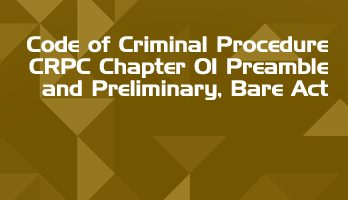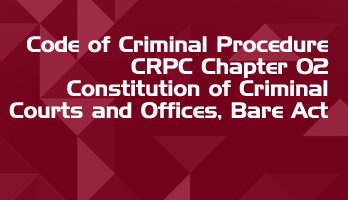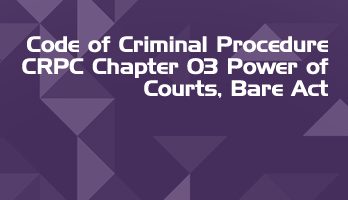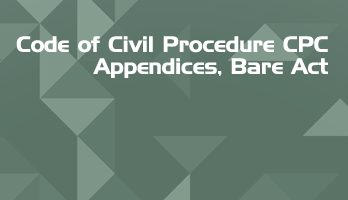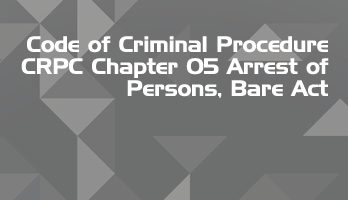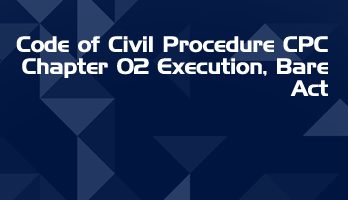A 'Bare act' is the actual legislation passed by the Parliament of India. Generally, an act sets out the high level legal and policy principles applicable to the subject matter of the law.
Most acts are accompanied by 'subsidiary legislation' such as rules, regulations, notifications and orders; which address the actual implementation detail of the act.
Free Full Course Available on LawMint's YouTube Channel
How to Land Your Dream LLB Internship in a Top Law Firm
- Part 1 - Introduction
- Part 2 - Internship Planning
- Part 3 - Internship Research
- Part 4 - Building Your Profile
- Part 5 - The Email
- Part 6 - The Resume
- Part 7 - The Cover Letter
- Part 8 - The Interview
- Part 9 - Self Development
Practical and comprehensive course, with real examples and step-by-step analysis of the complete internship application process. Check out LawMint's YouTube channel now!
Indian Penal Code, 1860
Section 131 – Abetting mutiny, or attempting to seduce a soldier, sailor or airman from his duty
Whoever abets the committing of mutiny by an officer, soldier, sailor or airman, in the Army, Navy or Air Force of the Government of India or attempts to seduce any such officer, soldier, sailor or airman from his allegiance or his duty, shall be punished with imprisonment for life, or with imprisonment of either description for a term which may extend to ten years, and shall also be liable to fine.
Explanations
- In this section the words – officer, soldier, sailor – and – airman – include any person subject to the Army Act, the Army Act, 1950 (46 of 1950), the Naval Discipline Act, the Indian Navy (Discipline) Act, 1934 (34 of 1934) the Air Force Act or the Air Force Act, 1950 (45 of 1950), as the case may be.
Section 132 – Abetment of mutiny, if mutiny is committed in consequence thereof
Whoever abets the committing of mutiny by an officer, soldier, sailor or airman, in the Army, Navy or Air Force of the Government of India, shall, if mutiny be committed in consequence of that abetment, be punished with death or with imprisonment for life, or imprisonment of either description for a term which may extend to ten years, and shall also be liable to fine.
Section 133 – Abetment of assault by soldier, sailor or airman on his superior officer, when in execution of his office
Whoever abets an assault by an officer, soldier, sailor or airman, in the Army, Navy or Air Force of the Government of India, on any superior officer being in the execution of his office, shall be punished with imprisonment of either description for a term which may extend to three years, and shall also be liable to fine.
Section 134 – Abetment of such assault, if the assault committed
Whoever abets an assault by an officer, soldier, sailor or airman, in the Army, Navy or Air Force of the Government of India, on any superior officer being in the execution of his office, shall, if such assault be committed in consequence of that abetment be punished with imprisonment of either description for a term which may extend to seven years, and shall also be liable to fine.
Section 135 – Abetment of desertion of soldier, sailor or airman
Whoever, abets the desertion of any officer, soldier, sailor or airman, in the Army, Navy or Air Force of the Government of India, shall be punished with imprisonment of either description for a term which may extend to two years, or with fine, or with both.
Section 136 – Harbouring deserter
Whoever, except as hereinafter excepted, knowing or having reason to believe that an officer, soldier, sailor or airman, in the Army, Navy or Air Force of the Government of India, has deserted, harbours such officer, soldier, sailor or airman, shall be punished with imprisonment of either description for a term which may extend to two years, or with fine or with both.
Exceptions
- This provision does not extend to the case in which the harbour is given by a wife to her husband.
Section 137 – Deserter concealed on board merchant vessel through negligence of master
The master or person in charge of a merchant vessel, on board of which any deserter from the Army, Navy or Air Force of the Government of India is concealed, shall, though ignorant of such concealment, be liable to a penalty not exceeding five hundred rupees, if he might have known of such concealment but for some neglect of his duty as such master or person in charge, or but for some want of discipline on board of the vessel.
Section 138 – Abetment of act of insubordination by soldier, sailor or airman
Whoever abets what he knows to be an act of insubordination by an officer, soldier, sailor or airman, in the Army, Navy or air Force, of the Government of India, shall, if such act of insubordination be committed in consequence of that abetment, be punished with imprisonment of either description for a term which may extend to six months, or with fine, or with both.
Section 138A – (Repealed) Application of foregoing sections to the Indian Marine Service.
Rep. by the Amending Act, 1934 (35 of 1934), s. 2 and Sch.
Section 139 – Persons subject to certain Acts
No person subject to the Army Act, the Army Act, 1950 (46 of 1950), the Naval Discipline Act, the Indian Navy (Discipline) Act, 1934 (34 of 1934), the Air Force Act or the Air Force Act, 1950 (45 of 1950), is subject to punishment under this Code for any of the offences defined in this Chapter.
Section 140 – Wearing garb or carrying token used by soldier, sailor or airman
Whoever, not being a soldier, sailor or airman in the Military, Naval or Air service of the Government of India, wears any garb or carries any token resembling any garb or token used by such a soldier, sailor or airman with the intention that it may be believed that he is such a soldier, sailor or airman, shall be punished with imprisonment of either description for a term which may extend to three months, or with fine which may extend to five hundred rupees, or with both.
Important Central Acts in Regional Languages
Legislative department website also features regional language versions of several important Central Acts.
Free Full Course Available on LawMint's YouTube Channel
How to Land Your Dream LLB Internship in a Top Law Firm
- Part 1 - Introduction
- Part 2 - Internship Planning
- Part 3 - Internship Research
- Part 4 - Building Your Profile
- Part 5 - The Email
- Part 6 - The Resume
- Part 7 - The Cover Letter
- Part 8 - The Interview
- Part 9 - Self Development
Practical and comprehensive course, with real examples and step-by-step analysis of the complete internship application process. Check out LawMint's YouTube channel now!







